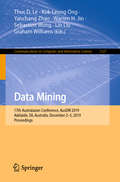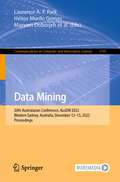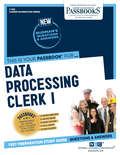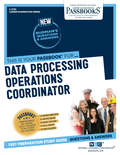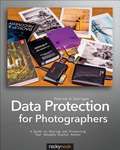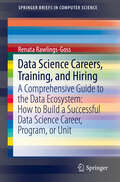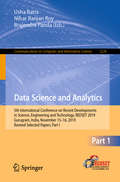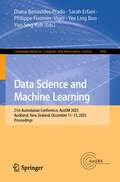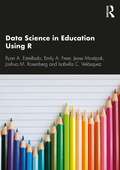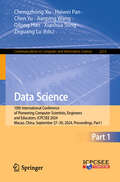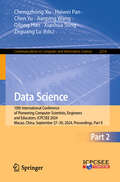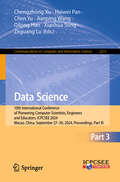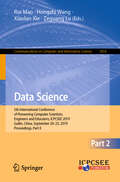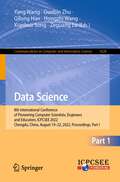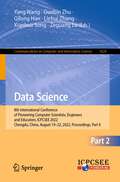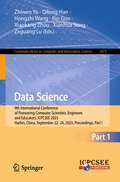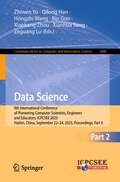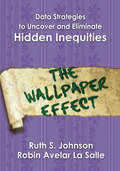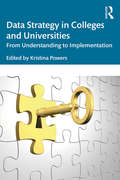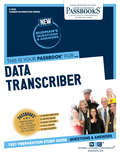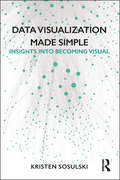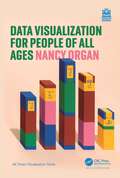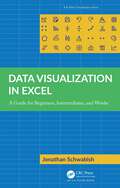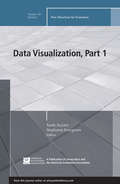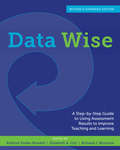- Table View
- List View
Data Mining: 17th Australasian Conference, AusDM 2019, Adelaide, SA, Australia, December 2–5, 2019, Proceedings (Communications in Computer and Information Science #1127)
by Lin Liu Kok-Leong Ong Graham Williams Yanchang Zhao Thuc D. Le Warren H. Jin Sebastien WongThis book constitutes the refereed proceedings of the 17th Australasian Conference on Data Mining, AusDM 2019, held in Adelaide, SA, Australia, in December 2019.The 20 revised full papers presented were carefully reviewed and selected from 56 submissions. The papers are organized in sections on research track, application track, and industry showcase.
Data Mining: 20th Australasian Conference, AusDM 2022, Western Sydney, Australia, December 12–15, 2022, Proceedings (Communications in Computer and Information Science #1741)
by Yee Ling Boo Graham Williams Yun Sing Koh Yanchang Zhao Simeon Simoff Laurence A. F. Park Heitor Murilo Gomes Maryam DoborjehThis book constitutes the refereed proceedings of the 20th Australasian Conference on Data Mining, AusDM 2022, held in Western Sydney, Australia, during December 12–15, 2022. The 17 full papers included in this book were carefully reviewed and selected from 44 submissions. They were organized in topical sections as research track and application track.
Data Processing Clerk I: Passbooks Study Guide (Career Examination Series)
by National Learning CorporationThe Data Processing Clerk I Passbook® prepares you for your test by allowing you to take practice exams in the subjects you need to study. It provides hundreds of questions and answers in the areas that will likely be covered on your upcoming exam.
Data Processing Operations Coordinator: Passbooks Study Guide (Career Examination Series)
by National Learning CorporationThe Data Processing Operations Coordinator Passbook® prepares you for your test by allowing you to take practice exams in the subjects you need to study. It provides hundreds of questions and answers in the areas that will likely be covered on your upcoming exam, including but not limited to: use, operation, and routine maintenance of computer hardware and peripheral equipment; work scheduling; basic techniques and concepts of computer programming and computer systems analysis; data processing center operations and operating systems; administrative supervision; and more.
Data Protection for Photographers
by Patrick H. CorriganAll photographers, both amateur and professional, are faced with the important issues of data protection and storage. Without knowledge of the options, tools, and procedures for safe and effective image protection and storage, photographers run the serious risk of losing their image files. This book offers critical information about the best hardware, software, procedures, and practices for capturing, storing, and preserving images and other data. This book explains current data protection and storage technologies in everyday terms. It describes effective procedures for protecting data, from capture to backup and archiving. Descriptions of specific products applicable to Windows, MacOS, and Linux systems are provided.
Data Science Careers, Training, and Hiring: A Comprehensive Guide to the Data Ecosystem: How to Build a Successful Data Science Career, Program, or Unit (SpringerBriefs in Computer Science)
by Renata Rawlings-GossThis book is an information packed overview of how to structure a data science career, a data science degree program, and how to hire a data science team, including resources and insights from the authors experience with national and international large-scale data projects as well as industry, academic and government partnerships, education, and workforce. Outlined here are tips and insights into navigating the data ecosystem as it currently stands, including career skills, current training programs, as well as practical hiring help and resources. Also, threaded through the book is the outline of a data ecosystem, as it could ultimately emerge, and how career seekers, training programs, and hiring managers can steer their careers, degree programs, and organizations to align with the broader future of data science. Instead of riding the current wave, the author ultimately seeks to help professionals, programs, and organizations alike prepare a sustainable plan for growth in this ever-changing world of data. The book is divided into three sections, the first “Building Data Careers”, is from the perspective of a potential career seeker interested in a career in data, the second “Building Data Programs” is from the perspective of a newly forming data science degree or training program, and the third “Building Data Talent and Workforce” is from the perspective of a Data and Analytics Hiring Manager. Each is a detailed introduction to the topic with practical steps and professional recommendations. The reason for presenting the book from different points of view is that, in the fast-paced data landscape, it is helpful to each group to more thoroughly understand the desires and challenges of the other. It will, for example, help the career seekers to understand best practices for hiring managers to better position themselves for jobs. It will be invaluable for data training programs to gain the perspective of career seekers, who they want to help and attract as students. Also, hiring managers will not only need data talent to hire, but workforce pipelines that can only come from partnerships with universities, data training programs, and educational experts. The interplay gives a broader perspective from which to build.
Data Science and Analytics: 5th International Conference on Recent Developments in Science, Engineering and Technology, REDSET 2019, Gurugram, India, November 15–16, 2019, Revised Selected Papers, Part I (Communications in Computer and Information Science #1229)
by Brajendra Panda Usha Batra Nihar Ranjan RoyThis two-volume set (CCIS 1229 and CCIS 1230) constitutes the refereed proceedings of the 5th International Conference on Recent Developments in Science, Engineering and Technology, REDSET 2019, held in Gurugram, India, in November 2019. The 74 revised full papers presented were carefully reviewed and selected from total 353 submissions. The papers are organized in topical sections on data centric programming; next generation computing; social and web analytics; security in data science analytics; big data analytics.
Data Science and Machine Learning: 21st Australasian Conference, AusDM 2023, Auckland, New Zealand, December 11–13, 2023, Proceedings (Communications in Computer and Information Science #1943)
by Yee Ling Boo Philippe Fournier-Viger Yun Sing Koh Diana Benavides-Prado Sarah ErfaniThis book constitutes the proceedings of the 21st Australasian Conference on Data Science and Machine Learning, AusDM 2023, held in Auckland, New Zealand, during December 11–13, 2023.The 20 full papers presented in this book were carefully reviewed and selected from 50 submissions. The papers are organized in the following topical sections: research track and application track. They deal with topics around data science and machine learning in everyday life.
Data Science in Education Using R
by Ryan A. Estrellado Emily A. Freer Jesse Mostipak Joshua M. Rosenberg Isabella C. VelásquezData Science in Education Using R is the go-to reference for learning data science in the education field. The book answers questions like: What does a data scientist in education do? How do I get started learning R, the popular open-source statistical programming language? And what does a data analysis project in education look like? If you’re just getting started with R in an education job, this is the book you’ll want with you. This book gets you started with R by teaching the building blocks of programming that you’ll use many times in your career. The book takes a "learn by doing" approach and offers eight analysis walkthroughs that show you a data analysis from start to finish, complete with code for you to practice with. The book finishes with how to get involved in the data science community and how to integrate data science in your education job. This book will be an essential resource for education professionals and researchers looking to increase their data analysis skills as part of their professional and academic development.
Data Science: 10th International Conference of Pioneering Computer Scientists, Engineers and Educators, ICPCSEE 2024, Macao, China, September 27–30, 2024, Proceedings, Part I (Communications in Computer and Information Science #2213)
by Qilong Han Xianhua Song Zeguang Lu Chen Yu Jianping Wang Chengzhong Xu Haiwei PanThis three-volume set CCIS 2213-2215 constitutes the refereed proceedings of the 10th International Conference of Pioneering Computer Scientists, Engineers and Educators, ICPCSEE 2024, held in Macau, China, during September 27–30, 2024. The 74 full papers and 3 short papers presented in these three volumes were carefully reviewed and selected from 249 submissions. The papers are organized in the following topical sections: Part I: Novel methods or tools used in big data and its applications; applications of data science. Part II: Education research, methods and materials for data science and engine; data security and privacy; big data mining and knowledge management. Part III: Infrastructure for data science; social media and recommendation system; multimedia data management and analysis.
Data Science: 10th International Conference of Pioneering Computer Scientists, Engineers and Educators, ICPCSEE 2024, Macao, China, September 27–30, 2024, Proceedings, Part II (Communications in Computer and Information Science #2214)
by Qilong Han Xianhua Song Zeguang Lu Chen Yu Jianping Wang Chengzhong Xu Haiwei PanThis three-volume set CCIS 2213-2215 constitutes the refereed proceedings of the 10th International Conference of Pioneering Computer Scientists, Engineers and Educators, ICPCSEE 2024, held in Macau, China, during September 27–30, 2024. The 74 full papers and 3 short papers presented in these three volumes were carefully reviewed and selected from 249 submissions. The papers are organized in the following topical sections: Part I: Novel methods or tools used in big data and its applications; applications of data science. Part II: Education research, methods and materials for data science and engine; data security and privacy; big data mining and knowledge management. Part III: Infrastructure for data science; social media and recommendation system; multimedia data management and analysis.
Data Science: 10th International Conference of Pioneering Computer Scientists, Engineers and Educators, ICPCSEE 2024, Macao, China, September 27–30, 2024, Proceedings, Part III (Communications in Computer and Information Science #2215)
by Qilong Han Xianhua Song Zeguang Lu Chen Yu Jianping Wang Chengzhong Xu Haiwei PanThis three-volume set CCIS 2213-2215 constitutes the refereed proceedings of the 10th International Conference of Pioneering Computer Scientists, Engineers and Educators, ICPCSEE 2024, held in Macau, China, during September 27–30, 2024. The 74 full papers and 3 short papers presented in these three volumes were carefully reviewed and selected from 249 submissions. The papers are organized in the following topical sections: Part I: Novel methods or tools used in big data and its applications; applications of data science. Part II: Education research, methods and materials for data science and engine; data security and privacy; big data mining and knowledge management. Part III: Infrastructure for data science; social media and recommendation system; multimedia data management and analysis.
Data Science: 5th International Conference of Pioneering Computer Scientists, Engineers and Educators, ICPCSEE 2019, Guilin, China, September 20–23, 2019, Proceedings, Part II (Communications in Computer and Information Science #1059)
by Hongzhi Wang Zeguang Lu Xiaolan Xie Rui MaoThis two volume set (CCIS 1058 and 1059) constitutes the refereed proceedings of the 5th International Conference of Pioneering Computer Scientists, Engineers and Educators, ICPCSEE 2019 held in Guilin, China, in September 2019. The 104 revised full papers presented in these two volumes were carefully reviewed and selected from 395 submissions. The papers cover a wide range of topics related to basic theory and techniques for data science including data mining; data base; net work; security; machine learning; bioinformatics; natural language processing; software engineering; graphic images; system; education; application.
Data Science: 8th International Conference of Pioneering Computer Scientists, Engineers and Educators, ICPCSEE 2022, Chengdu, China, August 19–22, 2022, Proceedings, Part I (Communications in Computer and Information Science #1628)
by Yang Wang Qilong Han Hongzhi Wang Xianhua Song Zeguang Lu Guobin ZhuThis two volume set (CCIS 1628 and 1629) constitutes the refereed proceedings of the 8th International Conference of Pioneering Computer Scientists, Engineers and Educators, ICPCSEE 2022 held in Chengdu, China, in August, 2022. The 65 full papers and 26 short papers presented in these two volumes were carefully reviewed and selected from 261 submissions. The papers are organized in topical sections on: Big Data Mining and Knowledge Management; Machine Learning for Data Science; Multimedia Data Management and Analysis.
Data Science: 8th International Conference of Pioneering Computer Scientists, Engineers and Educators, ICPCSEE 2022, Chengdu, China, August 19–22, 2022, Proceedings, Part II (Communications in Computer and Information Science #1629)
by Yang Wang Qilong Han Xianhua Song Zeguang Lu Guobin Zhu Liehui ZhangThis two volume set (CCIS 1628 and 1629) constitutes the refereed proceedings of the 8th International Conference of Pioneering Computer Scientists, Engineers and Educators, ICPCSEE 2022 held in Chengdu, China, in August, 2022. The 65 full papers and 26 short papers presented in these two volumes were carefully reviewed and selected from 261 submissions. The papers are organized in topical sections on: Big Data Management and Applications; Data Security and Privacy; Applications of Data Science; Infrastructure for Data Science; Education Track; Regulatory Technology in Finance.
Data Science: 9th International Conference of Pioneering Computer Scientists, Engineers and Educators, ICPCSEE 2023, Harbin, China, September 22–24, 2023, Proceedings, Part I (Communications in Computer and Information Science #1879)
by Qilong Han Hongzhi Wang Xianhua Song Zeguang Lu Zhiwen Yu Bin Guo Xiaokang ZhouThis two-volume set (CCIS 1879 and 1880) constitutes the refereed proceedings of the 9th International Conference of Pioneering Computer Scientists, Engineers and Educators, ICPCSEE 2023 held in Harbin, China, during September 22–24, 2023. The 52 full papers and 14 short papers presented in these two volumes were carefully reviewed and selected from 244 submissions. The papers are organized in the following topical sections:Part I: Applications of Data Science, Big Data Management and Applications, Big Data Mining and Knowledge Management, Data Visualization, Data-driven Security, Infrastructure for Data Science, Machine Learning for Data Science and Multimedia Data Management and Analysis.Part II: Data-driven Healthcare, Data-driven Smart City/Planet, Social Media and Recommendation Systems and Education using big data, intelligent computing or data mining, etc.
Data Science: 9th International Conference of Pioneering Computer Scientists, Engineers and Educators, ICPCSEE 2023, Harbin, China, September 22–24, 2023, Proceedings, Part II (Communications in Computer and Information Science #1880)
by Qilong Han Hongzhi Wang Xianhua Song Zeguang Lu Zhiwen Yu Bin Guo Xiaokang ZhouThis two-volume set (CCIS 1879 and 1880) constitutes the refereed proceedings of the 9th International Conference of Pioneering Computer Scientists, Engineers and Educators, ICPCSEE 2023 held in Harbin, China, during September 22–24, 2023.The 52 full papers and 14 short papers presented in these two volumes were carefully reviewed and selected from 244 submissions. The papers are organized in the following topical sections:Part I: Applications of Data Science, Big Data Management and Applications, Big Data Mining and Knowledge Management, Data Visualization, Data-driven Security, Infrastructure for Data Science, Machine Learning for Data Science and Multimedia Data Management and Analysis.Part II: Data-driven Healthcare, Data-driven Smart City/Planet, Social Media and Recommendation Systems and Education using big data, intelligent computing or data mining, etc.
Data Strategies to Uncover and Eliminate Hidden Inequities: The Wallpaper Effect
by Ruth S. Johnson Robin L. Avelar La SalleUncover buried data to close the achievement gap! Standardized test scores only reveal part of the story. Many hidden factors contribute to the achievement gap and chronic low school performance. The authors dramatically illustrate how to mine data from nontraditional sources—disciplinary policies, teacher attendance, special education referrals, and more—to uncover and eliminate systemic inequities. This solution-focused guide helps teachers and leaders: Ask the right questions Verify data that affects graduation rates, special education placement, and the achievement of English learners Effectively analyze data to improve student achievement Challenge the status quo and take action
Data Strategy in Colleges and Universities: From Understanding to Implementation
by Kristina PowersThis valuable resource helps institutional leaders understand and implement a data strategy at their college or university that maximizes benefits to all creators and users of data. Exploring key considerations necessary for coordination of fragmented resources and the development of an effective, cohesive data strategy, this book brings together professionals from different higher education experiences and perspectives, including academic, administration, institutional research, information technology, and student affairs. Focusing on critical elements of data strategy and governance, each chapter in Data Strategy in Colleges and Universities helps higher education leaders address a frustrating problem with much-needed solutions for fostering a collaborative, data-driven strategy.
Data Transcriber: Passbooks Study Guide (Career Examination Series)
by National Learning CorporationThe Data Transcriber Passbook® prepares you for your test by allowing you to take practice exams in the subjects you need to study. It provides hundreds of questions and answers in the areas that will likely be covered on your upcoming exam.
Data Visualization Made Simple: Insights into Becoming Visual
by Kristen SosulskiData Visualization Made Simple is a practical guide to the fundamentals, strategies, and real-world cases for data visualization, an essential skill required in today’s information-rich world. With foundations rooted in statistics, psychology, and computer science, data visualization offers practitioners in almost every field a coherent way to share findings from original research, big data, learning analytics, and more. In nine appealing chapters, the book: examines the role of data graphics in decision-making, sharing information, sparking discussions, and inspiring future research; scrutinizes data graphics, deliberates on the messages they convey, and looks at options for design visualization; and includes cases and interviews to provide a contemporary view of how data graphics are used by professionals across industries Both novices and seasoned designers in education, business, and other areas can use this book’s effective, linear process to develop data visualization literacy and promote exploratory, inquiry-based approaches to visualization problems.
Data Visualization for People of All Ages (ISSN)
by Nancy OrganData visualization is the art and science of making information visible. On paper and in our imaginations, it’s a language of shapes and colors that holds our best ideas and most important questions. As we find ourselves swimming in data of all kinds, visualization can help us to understand, express, and explore the richness of the world around us. No matter your age or background, this book opens the door to new ways of thinking and sharing through the power of data visualization.Data Visualization for People of All Ages is a field guide to visual literacy, born from the author’s personal experience working with world-class scholars, engineers, and scientists. By walking through the different ways of showing data—including color, angle, position, and length—you’ll learn how charts and graphs truly work so that no visualization is ever a mystery or out of reach. It doesn’t stop at what fits on a page, either. You’ll journey into cutting-edge topics like data sonification and data physicalization, using sound and touch to share data across the different senses. Packed with practical examples and exercises to help you connect the dots, this book will teach you how to create and understand data visualizations on your own—all without writing a single line of code or getting tangled up in software.Written with accessibility in mind, this book invites everyone to the table to share the joy of one of today’s most necessary skills. Perfect for home or classroom use, this friendly companion gives people of all ages everything they need to start visualizing with confidence.
Data Visualization in Excel: A Guide for Beginners, Intermediates, and Wonks (AK Peters Visualization Series)
by Jonathan SchwabishThis book closes the gap between what people think Excel can do and what they can achieve in the tool. Over the past few years, recognition of the importance of effectively visualizing data has led to an explosion of data analysis and visualization software tools. But for many people, Microsoft Excel continues to be the workhorse for their data visualization needs, not to mention the only tool that many data workers have access to. Although Excel is not a specialist data visualization platform, it does have strong capabilities. The default chart types do not need to be the limit of the tool’s data visualization capabilities, and users can extend its features by understanding some key elements and strategies. Data Visualization in Excel provides a step-by-step guide to creating more advanced and often more effective data visualizations in Excel and is the perfect guide for anyone who wants to create better, more effective, and more engaging data visualizations.
Data Visualization, Part 1: New Directions for Evaluation, Number 139 (J-B PE Single Issue (Program) Evaluation)
by Stephanie Evergreen Tarek AzzamDo you communicate data and information to stakeholders? This issue is Part 1 of a two-part series on data visualization and evaluation. In Part 1, we introduce recent developments in the quantitative and qualitative data visualization field and provide a historical perspective on data visualization, its potential role in evaluation practice, and future directions. It discusses: Quantitative visualization methods such as tree maps Sparklines Web-based interactive visualization Different types of qualitative data visualizations, alongwith examples in various evaluation contexts A toolography describing additional data visualization toolsand software, along with their major strengths and limitations. Intended as a guidance for understanding and designing data visualizations, this issue introduces fundamental concepts and links them to daily practice.This is the 139th volume of the Jossey-Bass quarterly report series New Directions for Evaluation, an official publication of the American Evaluation Association.
Data Wise, Revised and Expanded Edition: A Step-by-Step Guide to Using Assessment Results to Improve Teaching and Learning
by Kathryn Parker BoudettData Wise, Third Edition will be available in August 2025 ***Data Wise, Revised and Expanded Edition presents a continuous, sustainable process that allows school leaders to harness classroom metrics to inform educational practice. At its core, the Data Wise method fosters effective collaboration among educators, enabling teams to study a wide range of evidence and then use what they learn to enrich school culture and climate and ensure that each student thrives. Kathryn Parker Boudett, Elizabeth A. City, and Richard J. Murnane offer clear guidance for enacting all stages of the Data Wise improvement process and for integrating data inquiry into long-term institutional practice. They begin with actions that lay the groundwork for collaboration: advancing assessment literacy among contributors, building productive professional learning communities, and identifying targets for change. They continue with advice on evaluating progress and boosting accountability. Throughout the book, the authors recommend practical tools and proven practices, such as the plus/delta protocol and the ACE Habits of Mind (focusing on action, collaboration, and evidence), that help school leaders optimize the quality of meetings, especially those in which educators analyze data. They also provide tips for how to make best use of developments in education and technology, from Common Core State Standards to online collaboration tools. The field-tested strategies of the Data Wise improvement process have been used to great success in schools around the world, showing that careful examination of test scores, classroom data, and other educational evaluations can become a catalyst for important schoolwide conversations and transformations.
